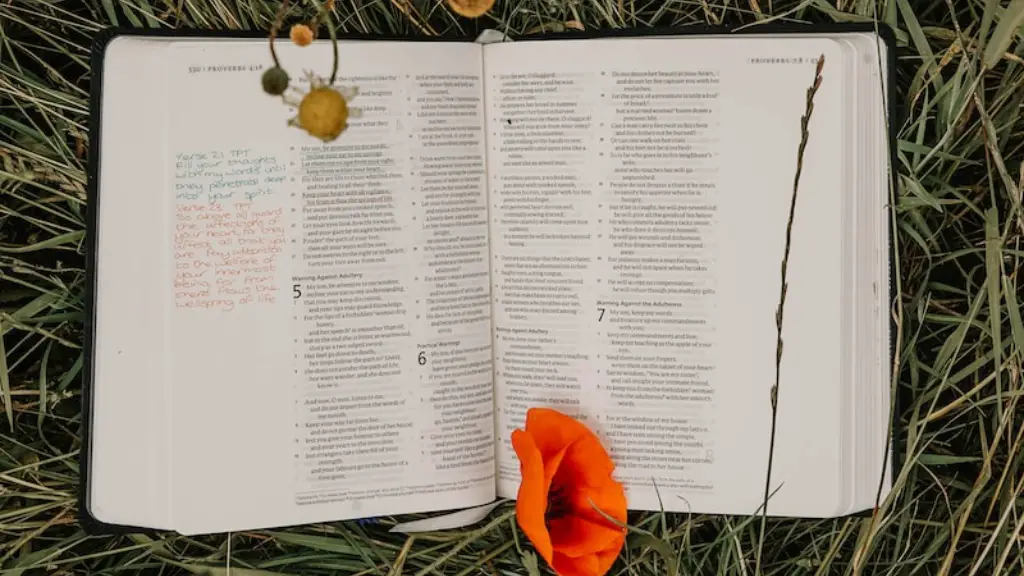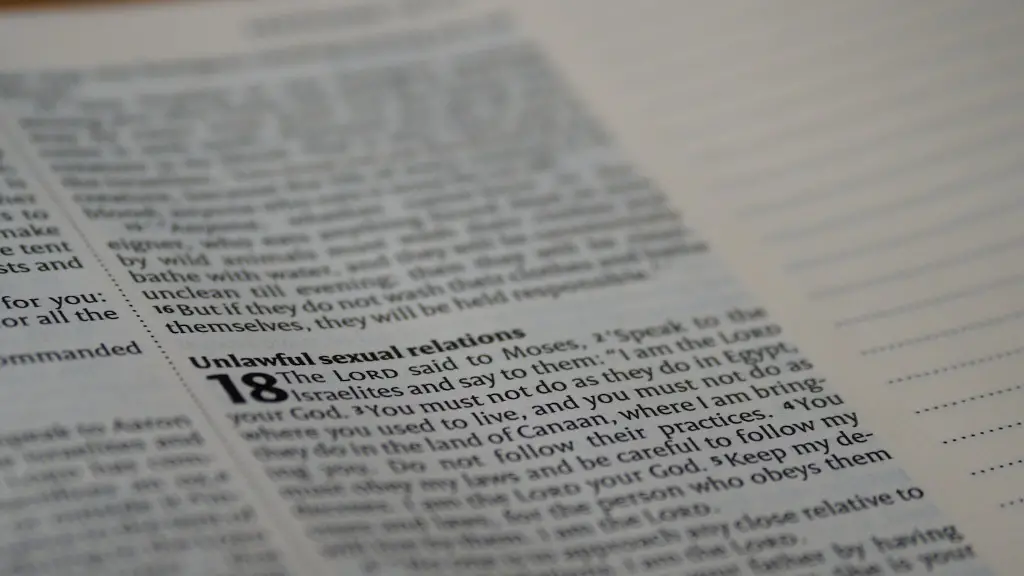People often wonder, “Is forgive and forget in the Bible?” All over the world, people talk about forgiveness and forgetfulness as important ingredients of a meaningful life. It’s also said to be a major part of every religion, yet rarely do people go beyond shallow phrases like “forgive and forget” or “it takes two to make a quarrel”. Bible scholars have long debated the answer to this question, with some arguing that the Bible does not support the idea of “forgive and forget”, while others have argued that there are hints of this kind of teaching in it.
In order to understand the concept of “forgive and forget”, one must first look at the definition of forgiveness. In Christianity, forgiveness is defined as an act of compassion and grace on the part of God, allowing a person to be reconciled with Him through Christ’s atoning death. It is an act of love and mercy that looks past past wrongs, grudges, and sins, and reconciles those who have hurt each other. This idea of forgiveness is found throughout the Bible, with several important scriptures speaking of God’s mercy and grace.
However, the concept of “forgive and forget” is a bit more nuanced. Some have argued that this phrase implies that one should simply let go of all ill will and grievances, and never think of them again. However, this does not appear to be what the Bible teaches. Instead, the Bible emphasizes that forgiveness does not necessarily mean a neglect of responsibility. Rather, it is an act of unburdening one’s heart from the pain of someone’s wrongs, and then trusting God to work in that person’s life in a way that brings them to repentance and reconciliation.
Many Bible scholars believe that there is a fine line between forgiving someone and forgetting what they have done. The Bible talks about how we should forgive “as far as the east is from the west”, indicating that we should remember the wrongs done to us, but not allow them to continue to impact us. In other words, the idea is not that we should forget the past, but instead that we should be willing to confront it, yet still find a way to reconcile with those who have caused pain.
In addition, it is also important to note that seeking forgiveness from others is not a means to excuse from wrongs or to simply “sweep things under the rug”. Rather, it’s about reconciling with those we have hurt, being willing to accept consequences, and making amends for our wrongs. It is a way of humbling ourselves before God and others, and showing that we are willing to work towards restoring relationships.
Overall, the Bible presents the idea of forgiveness and forgetfulness as two distinct concepts. While the Bible does not specifically use the terms “forgive and forget”, it does provide a framework for these concepts, teaching us the importance of humbly seeking God’s grace, and seeking a way to reconcile with those we have hurt.
How To Forgive and Forget
Forgiving someone and forgetting about the wrongs done to us goes hand in hand. While it is important to forgive, it is equally important to forget. While forgiving someone may be easier said than done, forgetting can be even harder. Here are some tips on how to forgive and forget:
1. Acknowledge the hurt. Acknowledging that we were wronged is an important step in the process of forgiving someone. By recognizing the pain we experienced, we can begin to let it go and forgive the person.
2. Understand that it takes time. It is unrealistic to expect to be able to forgive and forget instantly. Furthermore, it is important to remember that the level of hurt experienced is often related to the depth of hurt we experienced. Therefore, it is important to provide ourselves with enough time to process our feelings and to fully forgive the person.
3. Move on. It is important to find ways to move on from the hurt we have experienced. We can do this by focusing on the present, taking on new hobbies, volunteering, and even practicing mindfulness.
4. Practice self-compassion. It is important to remember that forgiveness is a process, and that it is okay if we are not able to immediately forgive and forget. Practicing self-compassion can help us to stay strong as we make progress towards forgiveness.
The Importance of Forgiveness and Forgetting
Forgiveness and forgetting are both essential aspects of the human experience. We are all faced with hurt and pain throughout our lives, and the only way to heal and to move forward is to practice both forgiveness and forgetting. It is only through forgiveness that we are able to accept the other person, reconcile with them, and build a stronger relationship.
At the same time, forgetting is also an essential aspect of the process. Without forgetting our pain, it is hard to build a healthy, new relationship. We need to learn to trust and be vulnerable again, and the only way to do this is to let go of the pain and to move on.
Furthermore, forgiving and forgetting brings us peace and healing. We can finally start to focus on the present and let go of any grudges or resentments we have been holding onto for so long. It can also empower us to become better people, to grow and to learn from our experiences.
Overall, forgiveness and forgetting are both important aspects of our lives and it is important that we practice both. As we forgive, we can begin to move forward in life, and ultimately find peace and healing.
Examples From the Bible
Throughout the Bible there are examples of people who were able to forgive and forget. One of the most profound examples is Peter’s forgiveness of Jesus’ crucifixion in John 21. This is a powerful illustration of the fact that forgiveness of wrongs is possible.
Jesus also sets an example of how to forgive and forget throughout the Gospel. He forgives the adulterous woman in John 8 and He forgives Peter for denying Him in John 21. In addition, Jesus taught us to forgive our enemies in Mark 11. All of these examples are powerful reminders of how we too can forgive and forget the wrongs we have experienced.
In the parable of the unforgiving servant, Jesus calls us to remember our own sins, and to forgive others from our hearts. In Luke 17:3-4, He says that we must forgive our brother “seventy times seven”, implying that we must constantly forgive and let go of our pain if we are to have real freedom from it.
These examples from the Bible are a reminder of the power of forgiveness and forgetfulness. We can look at these stories and take away an important lesson. That in spite of all that we experience, we can choose to forgive and forget and find healing through the power of God.
The Challenges of Forgive and Forget
Forgiveness and forgetting can be a very difficult task, especially when we have experienced deep hurt or betrayal. It can be hard to move on from the pain and heartbreaking to reconcile with someone who may have hurt us or those we love. Furthermore, forgiving someone can often make us feel vulnerable, as if we are reliving the pain all over again.
However, it is important to remember that forgiveness and forgetting don’t necessarily mean giving into the wrong done to us. Instead, it is an act of choosing to rebuild a broken relationship and to reconcile with one another. Doing this can be a difficult but powerful choice, and when done with the right attitude, can bring great healing to us and to those around us.
Finally, it is also important to remember that we should not expect the other person to change. Too often we forget that forgiveness is for us, not for them. We cannot control how others behave or respond, but we have the power to forgive from our hearts and to move on from the pain.
Conclusion
Is forgive and forget in the Bible? While the Bible does not specifically use the term “forgive and forget”, it does provide the framework for the concepts of forgiveness and forgetfulness. The Bible teaches us that we should seek God’s grace, humbly seek to reconcile with those we have hurt, and find ways to move on, remembering our wrongs but not allowing them to continue to impact us. Through the examples of Jesus, we are also reminded of the power that lies in forgiving and forgetting our wrongs and the healing that can come when we practice both.





